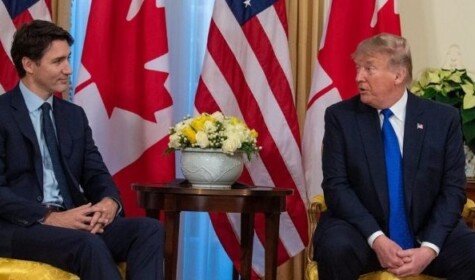Since becoming President, Donald Trump has worked to renegotiate NAFTA with Mexico and Canada. These negotiations resulted in the new USMCA (US-Mexico-Canada Free Trade Agreement) trade deal that was signed and ratified by the US Congress in January 2020. While technically, USMCA won’t be finalized until Canada ratifies it (Ottawa has only just started the ratification process), and when it does, USMCA will go into effect 90 days later since Mexico has already approved it.
That said, not everyone is pleased with the result. Ahead of the Congressional vote, a US environmental coalition that included Food and Water Action, Friends of the Earth, Greenpeace and the League of Conservation Voters, wrote a public letter in opposition to the deal. The letter stated that the trade agreement ‘…does not even mention climate change, fails to adequately address toxic pollution, includes weak environmental standards and an even weaker enforcement mechanism, supports fossil fuels, and allows oil and gas corporations to challenge climate and environmental protections.’
So, what does USMCA mean in terms of food and farming?
Regarding food safety standards, USMCA establishes equivalency across the three North American nations. Equivalency means that the food safety standard of each nation is considered to be equal. Consequently, if something is found to be safe for human consumption in the Unites States, it is automatically deemed safe for consumption in Mexico, and vice versa. While this is good in principle, there are questions around the transparency of the process since equivalency is agreed as part of the trade negotiations without adequate consultation with civil society. Secondly, if one of the negotiating states has more leverage than another, the weaker state might not be in a position to push-back on the claim of equivalency.
The establishment of equivalency through USMCA is cause for concern since the US approach to food safety is that a treatment/additive/chemical is deemed to be safe, unless it is proven to be unsafe. This starkly contrasts with the Canadian application of the precautionary principle, which asserts the need to prove a treatment/additive/chemical is safe for human consumption before it can be used. The precautionary principle is also the model used in the European Union.
For Canadian consumers, this could potentially mean that US products that were not approved for sale in Canada prior to USMCA, would automatically gain access to the market. This would include potassium bromate which is approved by the FDA to strengthen dough and promote rising in baked goods. It has been found to be a possible carcinogen by the International Agency for Research on Cancer (IARC). While currently banned in Canada, it continues to be approved for use in the US.
However, equivalency is not the only way in which USMCA will impact food standards. The problem is that international free trade agreements (such as USMCA) are designed to benefit transnational agribusinesses that are large enough to benefit from the economies of scale. It is companies like Mondelēz, Danone and Mars that have the global reach to benefit from this agreement, because these companies have the resources to ship huge quantities of food around North America, in a way that a small, local producer cannot.
Following the adoption of NAFTA in 1993, obesity rates rose significantly in both Mexico and Canada. In Mexico, this is attributed to outside investment (primarily from the US) and increased advertising of ultra-processed food. The combination of these factors led to an increase in the consumption of sugary beverages, which drove an obesity crisis in Mexico. Similarly, in Canada, NAFTA led to a rise in obesity and associated non-communicable diseases. The increase in Canadian obesity has been linked to a sharp decline in the price of high-fructose corn syrup, which was then incorporated into popular ultra-processed foods, largely without consumer awareness. Once the trade agreement was implemented, the daily per capita supply of caloric sweeteners (including from high-fructose corn syrup) rose from 21.2 kcal in the pre-NAFTA period to 62.9 kcal post-NAFTA.
It is quite possible that the increases in non-communicable diseases (NCDs) and obesity that were seen following the implementation of NAFTA, could be repeated following USMCA. However, it seems likely, as Alyshia Galvez, professor of American and Latino Studies at Lehman College, said: ‘Every major trade deal results in higher rates of obesity, diabetes, heart and kidney disease.’ This potential impact is, consequently, of considerable concern in Mexico where the obesity crisis is spiralling out of control. Last year, 72.5% of Mexican adults (approximately 56 million people)were considered obese or overweight. This led to the Mexican Government declaring an epidemiological emergency and introducing mandatory food labelling to indicate high fat or high sugar content in foods.
However, the newly signed USMCA might put this progressive labelling policy in jeopardy as it provides a legal route for big business to potentially challenge the labelling, creating a barrier to trade. Chile originally tried to implement nutrition labels on all foods that exceeded 275 calories, 400 milligrams of sodium, 10 grams of sugar or 4 grams of saturated fats per 100 grams. Products that featured the labels were not allowed to be advertised to children and could not be sold in or near schools. However, the US Trade Representative took Chile to the WTO saying that the labels create an unfair barrier to trade, and the labels were removed. Transnational food businesses are already suggesting similar action in Mexico and, since President Trump has pushed a deregulatory agenda that favours big business since entering office, such a legal challenge would likely win Presidential support.
That said, ‘American’ food shouldn’t be demonised as the epitome of ultra-processed, poor-quality food. There are truly excellent and inspiring farmers across the US who have strong environmental and ethical beliefs embedded in their farming practices. The problem is the economic dynamic and the corporate power that dictates the terms of international trade.
In order to avoid the negative consequences that seem to inevitably come with free trade agreements, we need to switch to a more equitable and sustainable economic model – one that values and supports sustainable farming and food production around the world and allows free- and fair-trade to occur. We cannot, and should not, go back to the days of closed borders and protectionist policies. However, governments around the world need to unlock the barriers to change and allow a more equitable economic system to flourish, where small-scale farmers can earn a living producing food sustainably and the public have healthy and nutritious diets.
Photograph: U.S. Secretary of Defence







